
Hank Brian Marvin is an English multi-instrumentalist, vocalist, and songwriter. He is known as the lead guitarist for the Shadows.

Xanadu is the soundtrack to the 1980 musical film of the same name, featuring the Australian singer Olivia Newton-John and the British group Electric Light Orchestra (ELO). It was released in June 1980 on MCA Records in the United States and July 1980 by Jet Records in the United Kingdom. The original LP release featured on side one the songs of Newton-John, and on side two the songs of ELO. In 2008 the soundtrack album was digitally remastered as a bonus CD as part of the film's DVD release titled Xanadu: Magical Musical Edition.

The Shadows were an English instrumental rock group, who dominated the British popular music charts in the pre-Beatles era from the late 1950s to the early 1960s. They served as the backing band for Cliff Richard from 1958 to 1968, and have joined him for several reunion tours.

Bruce Welch is an English guitarist, songwriter, producer, singer and businessman best known as a founding member of the Shadows.
John Clifford Farrar is an Australian music producer, songwriter, arranger, singer, and guitarist. As a musician, Farrar is a former member of several rock and roll groups including The Mustangs (1963–64), The Strangers (1964–70), Marvin, Welch & Farrar (1970–73), and The Shadows (1973–76). In 1980, he released a solo eponymous album. As a songwriter and producer, he worked with Olivia Newton-John from 1971 to 1989. He wrote her U.S. number-one hit singles: "Have You Never Been Mellow" (1975), "You're the One That I Want", "Hopelessly Devoted to You" (1978), and "Magic" (1980). He also produced the majority of her recorded material during that time, including her number-one albums, If You Love Me, Let Me Know (1974), Have You Never Been Mellow (1975), and Olivia's Greatest Hits Vol. 2 (1982). He was a co-producer of the soundtrack for the film Grease (1978).
Marvin, Welch & Farrar were a 1970s British and Australian popular music group formed by Hank Marvin and Bruce Welch, both members of The Shadows – as a change of direction manoeuvre during 1970 to 1973 – and John Farrar. The distinction was that while The Shadows were famous for their instrumental work, Marvin Welch & Farrar were a trio, vocal harmony group. They have been favourably compared to USA folk close harmony group Crosby Stills Nash and Young and The Hollies.

Physical is the eleventh studio album by British-Australian singer Olivia Newton-John, released through MCA Records on 13 October 1981. The album was produced and partly written by her long-time record producer John Farrar. Recorded and mixed at Ocean Way and David J. Holman's studio in Los Angeles, Physical became one of Newton-John's most controversial and sexual records, and her most successful studio album. Musically, the album features considerable use of synthesizers, and it explores lyrical themes such as love and relationships, sex, and environmental protection. Upon its release, the album received positive reviews from music critics, many of them considering it to be Newton-John's best effort. The album charted high in several countries, including the United States, Japan and Newton-John's native Australia, becoming one of the most successful albums of the early 1980s. It also ranks among the best-selling albums by Australian solo artists, selling more than ten million copies worldwide.
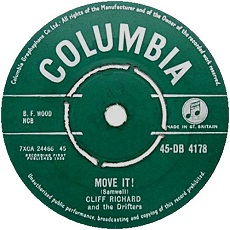
"Move It" is a song written by Ian Samwell and recorded by Cliff Richard and the Drifters. Originally intended as the B-side to "Schoolboy Crush", it was released as Richard's debut single on 29 August 1958 and became his first hit record, reaching number 2 on the UK Singles Chart. It is credited with being one of the first authentic rock and roll songs produced outside the United States. "Schoolboy Crush", written by Aaron Schroeder and Sharon Gilbert, had already been recorded in the US by Bobby Helms. Cliff Richard and the Drifters recorded their own version, which was intended to be the A-side of their debut single. However, when producer Jack Good heard "Move It", he insisted that Richard would have to sing that if he was to appear on Good's TV show Oh Boy! On the planned single, "Move It" was flipped to be the A-side and it went to number 2 in the charts, starting Cliff Richard on a career which included British hits through six decades.

"Dance On!" is an instrumental by British group the Shadows, released as a single in December 1962. It went to number 1 on the UK Singles Chart and the Irish Singles Chart. A vocal version, with lyrics by Marcel Stellman, was recorded by British female vocalist Kathy Kirby, whose version reached number 11 on the UK chart in September 1963.

Reunited is a 2009 studio album by British pop singer Cliff Richard and his original backing band the Shadows. The album celebrates the 50th anniversary of Cliff's first recordings and performances with The Shadows, and is their first studio collaboration for forty years. It features re-recordings of their hits from the late 1950s and early 1960s, plus three rock and roll era songs not previously recorded by them; "C'mon Everybody", "Sea Cruise" and the album's only single "Singing the Blues".

Wonderful Life is a soundtrack album by Cliff Richard with The Shadows to the 1964 film Wonderful Life. It is their third film soundtrack album and Richard's eleventh album overall. The album reached number 2 in the UK Albums Chart, spending 8 weeks in the top 3 and 23 weeks on in the top 20, but was a marked decline from their previous soundtrack album Summer Holiday that had spent 14 weeks at number 1.

Cliff Richard is the seventh studio album by Cliff Richard, released by Columbia Records on LP in 1965 and available in both mono and stereo. It is Richard's thirteenth album overall. The album peaked at number 9 in the UK Albums Chart.
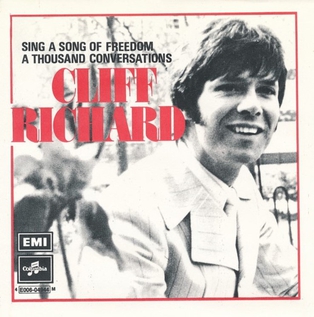
"Sing a Song of Freedom" is a song by British singer Cliff Richard, released as a single in October 1971. It peaked at number 13 on the UK Singles Chart.
"Sunny Honey Girl" is a song by the British musical group the Pipkins. It was written by Roger Cook, Roger Greenaway, John Goodison and Tony Hiller and was released as a single only in New Zealand in August 1970, charting for one week at number 18 on the New Zealand Listener Pop-O-Meter chart. The song appeared on the Pipkins' 1970 album Gimme Dat Ding.

Love Is Forever is the ninth studio album by Cliff Richard released in 1965. The album reached number 19 in the UK Album Charts, returning him to the chart after the failure of his last album When in Rome, and is primarily made up of pop standards such as "Long Ago ", "Have I Told You Lately That I Love You", and "Someday ".
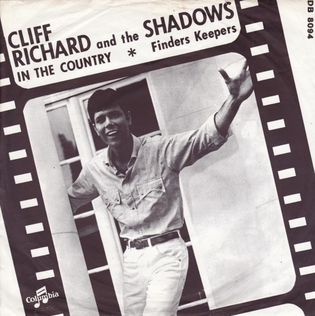
"In the Country" is a song by Cliff Richard and the Shadows, released as a single in December 1966. It peaked at number 6 on the UK Singles Chart.

"Living in Harmony" is a song by British singer Cliff Richard, released as a single in July 1972. It peaked at number 12 on the UK Singles Chart.
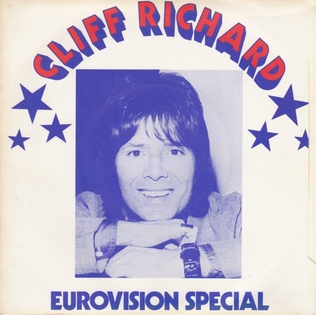
"Help It Along" is a song by British singer Cliff Richard, released as a four-track maxi single. It peaked at number 29 on the UK Singles Chart.

"Don't Forget to Catch Me" is a song by Cliff Richard and the Shadows, released as a single in November 1968 from their album Established 1958. It peaked at number 21 on the UK Singles Chart.
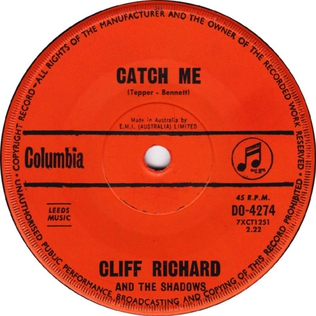
"Catch Me" is a song written by Sid Tepper and Roy C. Bennett and was first recorded in 1960 by American teenage singer Jeri Lynne Fraser and released as the B-side of her single "Poor Begonia " in August 1960.

















